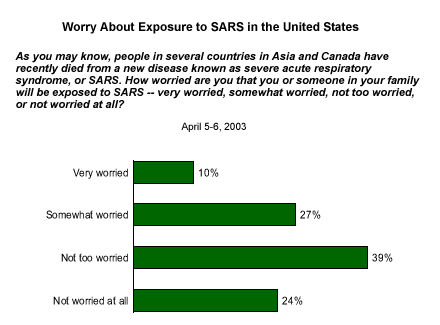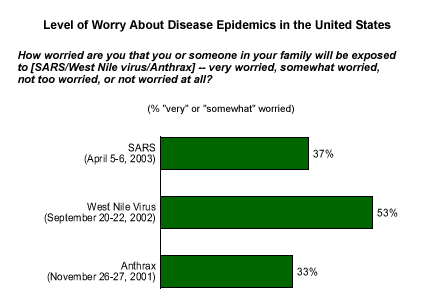The recent outbreak of severe acute respiratory syndrome (SARS) has people around the globe scrambling for medical masks in an attempt to ward off this mysterious illness. With its origins believed to be in China, SARS has demonstrated how quickly such a virus can spread in the age of frequent air travel. While the majority of deaths from this illness have occurred in Asian countries and Canada, data from an April 2003 Gallup Poll* show that a substantial number of Americans are also concerned about SARS.
Early this month, shortly after the outbreak of SARS in North America, Gallup asked Americans how worried they are that they or a family member will be exposed to SARS. More than a third (37%) of U.S. respondents said they are either very or somewhat worried that they or a family member will be exposed to it. (In comparison, 75% of Singaporean adults said they are very or somewhat worried about SARS in a recent Gallup Poll conducted in Singapore. See "Three in Four Singaporeans Worried About SARS" in Related Items.) A majority of Americans are still relatively unconcerned about SARS. Thirty-nine percent of U.S. adults are not too worried that they or a family member will be exposed to SARS, and nearly a quarter (24%) are not at all worried.

American women are somewhat more likely than American men to worry about exposure to SARS -- 42% of women are very or somewhat concerned, as are only 31% of men. On the other hand, 30% of men are not at all concerned about SARS, compared with 19% of women. This is a typical finding in Gallup Polls -- on a range of issues, including health matters and other threats such as terrorism -- women are more likely than men to express concern.
Although SARS is most likely to seriously affect elderly people and people with pre-existing medical conditions, there are no significant differences between older Americans and younger Americans with regard to their likelihood to worry about the disease.
SARS, West Nile Virus, and Anthrax
It is interesting to compare Americans' worries about exposure to SARS to their level of worry about other recent disease threats, such as West Nile virus and anthrax. The level of worry regarding SARS in the United States currently falls in between the levels of concern for the other two threats at the time when they were most prevalent.
Americans were substantially more concerned about exposure to West Nile virus last September than they are concerned about SARS today. Between Aug. 8, 2002, and March 13, 2003, more than 4,000 people in 40 U.S. states had been infected with West Nile, and the disease had resulted in 276 deaths. According to a September 2002 Gallup Poll, a majority of Americans (53%) expressed worry that they or a family member would be exposed to West Nile, which is transmitted through mosquito bites. About a third of Americans (30%) were not too worried about West Nile, while 16% were not worried at all.
On the other hand, during the anthrax scare following the Sept. 11, 2001, terrorist attacks, only about third of Americans were worried about anthrax exposure. In a Nov. 26-27, 2001, Gallup Poll, only 7% of Americans were very worried about exposure to anthrax, while 26% were somewhat worried. (Very few people died from anthrax exposure in 2001, and the disease cannot be spread from person to person -- only through exposure to anthrax itself.) More than two-thirds of Americans expressed little worry about anthrax at that time -- 34% of Americans were not too worried and 33% were not worried at all.

Bottom Line
SARS has reminded Americans and many other people that this age of globalization has brought new health-related threats to the world. A virus that originates in a small village in Asia may quickly find itself in a large city on the other side of the globe. Measures to control the virus are quickly being instituted in various countries, and for the time being Americans have not experienced as severe an outbreak of SARS as their neighbors to the north -- the disease has already claimed 13 lives in the Toronto area. Still, there is significant worry in America about this international threat.
*Results are based on telephone interviews with 1,009 national adults, aged 18 and older, conducted April 5-6, 2003. For results based on the total sample of national adults, one can say with 95% confidence that the maximum margin of sampling error is ±3%.